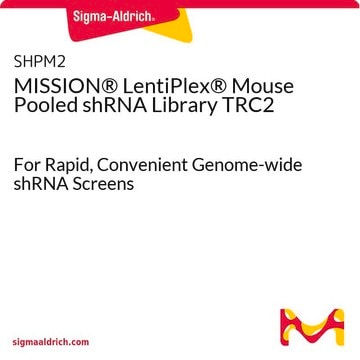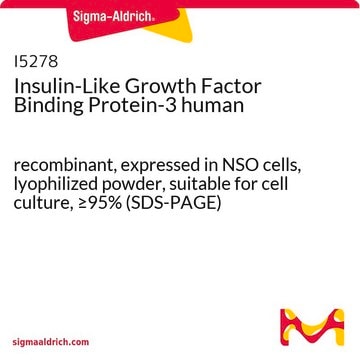I8529
Insulin-like Growth Factor Binding Protein-5 human
>90% (SDS-PAGE), recombinant, expressed in NSO cells, lyophilized powder
Synonym(s):
IGFBP-5
Sign Into View Organizational & Contract Pricing
All Photos(1)
About This Item
Recommended Products
biological source
human
Quality Level
recombinant
expressed in NSO cells
Assay
>90% (SDS-PAGE)
form
lyophilized powder
potency
0.5-1.5 mg per mL ED50
mol wt
34 kDa by SDS-PAGE (reducing)
calculated mol wt ~28 kDa
packaging
pkg of 25 μg
impurities
endotoxin, tested
UniProt accession no.
storage temp.
−20°C
Gene Information
human ... IGFBP5(3488)
General description
The gene IGFBP-5 (insulin-like growth factor binding protein-5) is mapped to human chromosome 2q35.
Biochem/physiol Actions
IGFBP-5 (insulin-like growth factor binding protein-5) interacts with IGFs and thereby controls IGF activity. High levels of IGFBP5 are present in systemic sclerosis and idiopathic pulmonary fibrosis conditions. It also plays a crucial role in cancer progression.
IGFBP-5 binds to bone cells and is the predominant insulin-like growth factor binding protein in bone. When IGFBP-5 binds the extracellular matrix, it modulates IGF activity. Mouse, human, and rat IGFBP-5 share 97% homology.
Physical form
Lyophilized from a 0.2 μm filtered solution in 30% acetonitrile and 0.1% TFA.
Analysis Note
The biological activity is measured by its ability to inhibit recombinant human IGF-1 or IGF-II on MCF-7 cells.
Storage Class Code
11 - Combustible Solids
WGK
WGK 3
Flash Point(F)
Not applicable
Flash Point(C)
Not applicable
Personal Protective Equipment
dust mask type N95 (US), Eyeshields, Gloves
Certificates of Analysis (COA)
Search for Certificates of Analysis (COA) by entering the products Lot/Batch Number. Lot and Batch Numbers can be found on a product’s label following the words ‘Lot’ or ‘Batch’.
Already Own This Product?
Find documentation for the products that you have recently purchased in the Document Library.
V Hwa et al.
Endocrine reviews, 20(6), 761-787 (1999-12-22)
Over the last decade, the concept of an IGFBP family has been well accepted, based on structural similarities and on functional abilities to bind IGFs with high affinities. The existence of other potential IGFBPs was left open. The discovery of
Baxter, R.C.
American Journal of Physiology. Endocrinology and Metabolism, 278 (2000)
Maya Ghoussaini et al.
Nature communications, 4, 4999-4999 (2014-09-24)
GWAS have identified a breast cancer susceptibility locus on 2q35. Here we report the fine mapping of this locus using data from 101,943 subjects from 50 case-control studies. We genotype 276 SNPs using the 'iCOGS' genotyping array and impute genotypes
Yunyun Su et al.
PloS one, 10(6), e0130546-e0130546 (2015-06-24)
Insulin-like growth factor binding protein (IGFBP)-5 levels are increased in systemic sclerosis (SSc) skin and lung. We previously reported that IGFBP-5 is a pro-fibrotic factor that induces extracellular matrix (ECM) production and deposition. Since IGFBP-5 contains a nuclear localization signal
Mark E Reeves et al.
PloS one, 9(7), e101679-e101679 (2014-07-10)
RASSF1C is a major isoform of the RASSF1 gene, and is emerging as an oncogene. This is in contradistinction to the RASSF1A isoform, which is an established tumor suppressor. We have previously shown that RASSF1C promotes lung cancer cell proliferation
Our team of scientists has experience in all areas of research including Life Science, Material Science, Chemical Synthesis, Chromatography, Analytical and many others.
Contact Technical Service






